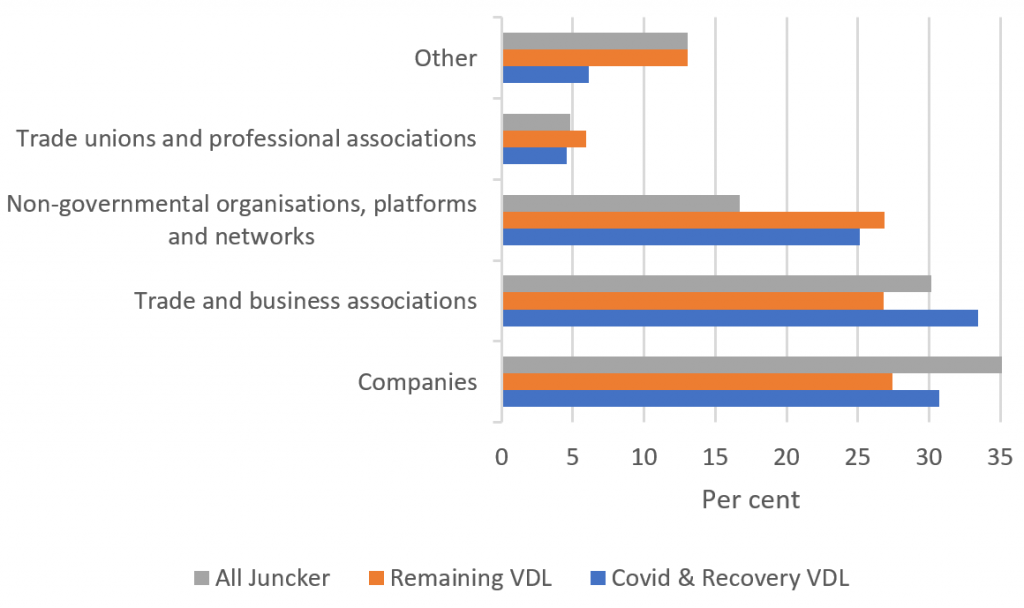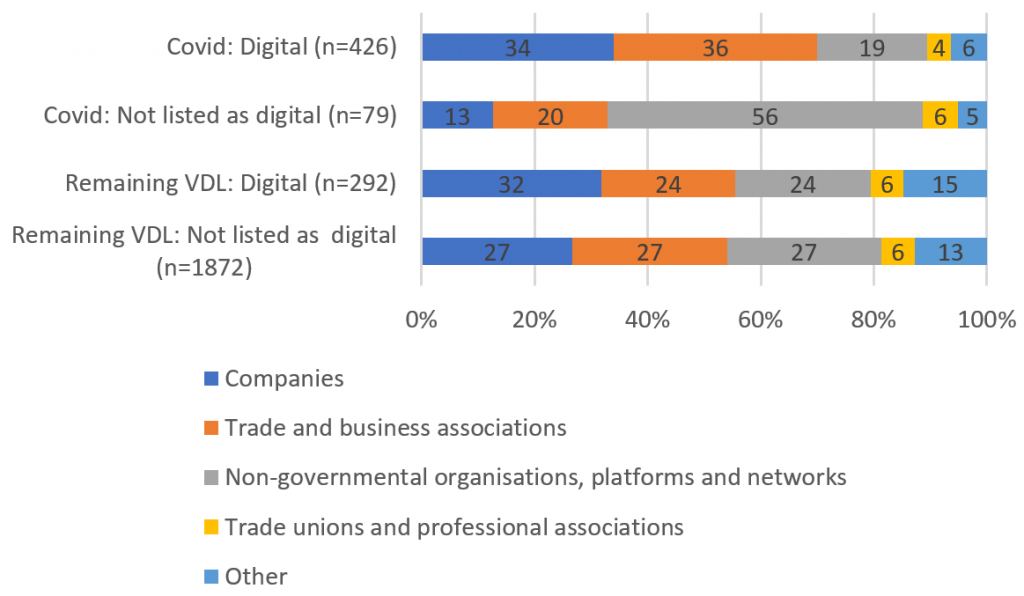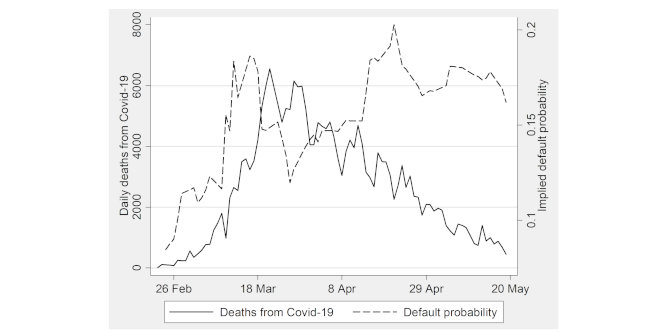 Covid-19 has been accompanied by a high level of lobbying activity as businesses and interest groups seek to influence the policies employed by governments to manage the economic fallout of the outbreak. Drawing on new research, Anne Rasmussen explains how lobbying has changed during the pandemic. She writes that while the relative access of different group types to Covid-19 meetings looks similar to other topics, the format of lobbying activities, notably the greater use of digital lobbying, could affect potential biases in the representation of different types of interest group.
Covid-19 has been accompanied by a high level of lobbying activity as businesses and interest groups seek to influence the policies employed by governments to manage the economic fallout of the outbreak. Drawing on new research, Anne Rasmussen explains how lobbying has changed during the pandemic. She writes that while the relative access of different group types to Covid-19 meetings looks similar to other topics, the format of lobbying activities, notably the greater use of digital lobbying, could affect potential biases in the representation of different types of interest group.
It’s clear that globally, the Covid-19 crisis has consolidated power within governments, leaving opposition parties in a bind. Governments have acted to ringfence decision making on lockdowns, special emergency measures, recovery funding and recently, plans for reopening societies. Although the opposition has gradually become more involved in many countries, criticism of the lack of democratic oversight remains, and (with hindsight) the necessity and severity of some of the measures adopted has been questioned.
However, Covid-19 has not only affected relationships between governments and their opposition. It has also affected lobbying and the way interest groups and businesses interact with policymakers. Given that Covid-19 has been seen by many as the biggest global crisis since WWII, this is hardly surprising. The crisis has blown a huge hole in the earnings and even the viability of a wide range of businesses, and has had a profound impact on the daily lives of billions. This has galvanised interest groups and businesses to mobilise – while, at the same time, governments have actively reached out for their expertise.
Even though social distancing has dramatically reduced opportunities for face-to-face lobbying, it’s perhaps not surprising that figures indicate that lobbying spending has actually increased under Covid-19. In the US, registry data gives information on both who’s lobbying on which issues and how much they spend. Based on preliminary records, Open Secrets reports that lobbying expenditure has been at almost record levels – $903m in the first quarter of 2020. Much attention has been directed at the largest aid package in US history, the $2.2 trillion Coronavirus Aid, Relief, and Economic Security (CARES) Act. CARES is also – unsurprisingly – the second most heavily lobbied bill in US history.
Records from the US and Canada reveal that the pandemic has opened up the lobbying playing field to many new players. My own calculations based on data from Transparency International also demonstrate high lobbying activity related to Covid-19 in the EU: ~500 interest groups and firms have held meetings with EU Commissioners and high-level Commission civil servants alone, where either ‘Covid’, ‘corona’ and/or ‘recovery’ was mentioned in the subject description of the meeting. In practice, the number of participants is likely to be even higher given that not all meetings relating to the Covid-19 agenda might explicitly have mentioned these keywords in the subject description.
In countries where there are less stringent rules for registering lobbying activity and expenditure, it is harder to directly measure changes during Covid-19. Yet, we know anecdotally from news reports that considerable amounts of lobbying have been directed at – inter alia – decisions on aid packages, ‘air bridges’ and international travel, and when and how to reopen different sectors of society.
In some respects, lobbying during Covid-19 looks like business as usual. After all, there is nothing unusual about interest groups mobilising when there is something at stake for them, or about governments reaching out for expertise and advice. At the same time, the way interest groups have participated in policymaking during Covid-19 has also been somewhat different to the status quo. I examine some of these new developments here, and I’ll argue that paradoxically they may both strengthen and weaken transparency and bias in interest representation.
Covid-19, lobbying and (digital) democracy
First, opposition parties and interest organisations have had limited chances to unpick or dissect rapidly enacted emergency legislation, or relief packages. Nonetheless, they have often been consulted and brought into the decision-making tent in novel ways.
In February and March, at the beginning of the crisis, open hearings, which are conventional in many systems and allow everyone to participate and submit evidence, were either cancelled, or were implemented with greatly compressed deadlines. Interactions have been focused on governments and there has been a shift from open to closed consultations. Denmark is a good example: the government has created a series of “sector partner communities”, through which stakeholders advise the government, for example on guidelines for the reopening of specific sectors.
It is too early to tell how these differences in the forms of stakeholder consultation used during Covid-19 have impacted how inclusive governments have been in their dealings with interest groups. Closed forms of consultation clearly present a risk of privileging certain selected stakeholder interests over those without a seat at the table. Yet closed fora can – counter intuitively – also give equal voice to a range of organisations, rather than favouring those with the greatest (spending) power. Existing literature on EU consultations has shown, for example, that domination by business interests is weaker when decision-makers only use closed forms of consultation, compared to when they use both open and closed forms.
Experiences of corona lobbyism thus far is not just about changed frameworks for consultation, but also about how organisations themselves choose to act – and how much access decision-makers permit them. In line with Churchill’s maxim to “never waste a good crisis”, business organisations and companies have been accused of exploiting the crisis for their own benefit. Business stakeholders have lobbied for more flexible (i.e lax) environmental regulation in order to survive the financial challenges precipitated by the outbreak. The Corporate Europe Observatory has established “Corona Lobby Watch” to keep track of what it dubs “corona washing”. The website contains stories of industries “reinventing” old demands or formulating new ones, using Covid-19 as justification. Even in the absence of a clear definition of “corona washing”, the anecdotes on their website give some examples of what lobbying during Covid-19 looks like.
My own unpublished analysis on who has been provided access to meetings with high-level Commission civil servants and Commissioners reveals a strong business dominance among participants in meetings explicitly mentioning ‘Covid’, ‘corona’ or ‘recovery’ in the subject description.
According to Figure 1, companies, and trade and business associations, account for two-thirds (64%) of all the participating actors. But it’s important to point out: even if there are differences in the relative prominence of different types of interest groups in Covid and non-Covid meetings, such differences are not overly stark. The share of companies and trade and business associations is ten percentage points higher for Covid than non-Covid related meetings during the von der Leyen Commission (sign at p<0.01) but the score for Covid meetings is not significantly different from the Juncker Commission.
In fact, the overall representation of business interests under Covid-19 and the Juncker Commission are almost identical. While there are small drops in the shares of both NGOs and unions participating in Covid related meetings, they are not significant from the rest of the von der Leyen meetings. It is also worth noting that NGOs have actually been far better represented in Covid-19 related meetings than they were during the Juncker Commission (sign at p<0.01). Overall, these access patterns of different group types to Covid-19 meetings show clear patterns of continuity, rather than demonstrating a fundamentally negative shift in bias and diversity.
Figure 1: Prominence of different types of organisations by subject and period
 Note: Own calculations based on data from Integrity Watch by Transparency International. Covid-19 related meetings are coded as mentioning “Covid”, “Corona” and/or “Recovery” in the subject description. Meetings up until May 20, 2020 are included. The total number of actors participating in meetings was 23,801 (Juncker), 505 (Covid & recovery meetings), 2,164 (Remaining von der Leyen).
Note: Own calculations based on data from Integrity Watch by Transparency International. Covid-19 related meetings are coded as mentioning “Covid”, “Corona” and/or “Recovery” in the subject description. Meetings up until May 20, 2020 are included. The total number of actors participating in meetings was 23,801 (Juncker), 505 (Covid & recovery meetings), 2,164 (Remaining von der Leyen).
Another development worth highlighting is that social distancing under Covid-19 has increased digital interest representation. Until February, fewer than one per cent of participants were registered as having taken part in digital meetings with the Commission. Between 1 February and 20 May, the share rises to 38%, and for participants in Covid-19 related meetings, it is as high as 84%.
These figures may even underestimate the number of digital participants, since the Commission might have failed to report some forms of digital contact, or not always have registered that meetings took place digitally. The significance and stickability of this shift from offline to digital advocacy is something that I will examine in much more detail in my European Research Council project ADVODID. Digital tools – such as social media – are sometimes seen as “weapons of the weak” allowing resource-poor organisations to generate content at a relatively low cost with the potentially high impact. Social media also have the potential to increase transparency of lobbying by leaving a discernable electronic audit trail.
But research so far has primarily shown that digital technology and social media do not necessarily have the democratising potential some expected. There is a danger that digital tools merely host “new wine in old bottles”, reinforcing offline inequalities in access and influence. It has also been pointed out that a lack of physical events further disadvantages precisely those organisations, journalists and citizens that find it difficult to secure face time with decisionmakers anyway. They can no longer use public events to compensate for limited direct access, and digital tools may be more suitable for managing existing contacts than for building up new ones.
The access data on meetings with the European Commission reveals some interesting patterns when we compare how prominent different types of interest are, depending on whether they participated in digital sessions and meetings related to Covid-19. Figure 2 underlines that my conclusion – that business interests dominate – applies across all categories of the disaggregated dataset, except Covid-19 meetings not reported as having taken place digitally. While the prominence of different types of organisations in digital and non-digital meetings is broadly similar for non-Covid-19 related meetings, there are some differences between these two categories for Covid-19 related meetings.
Here, business interests account for a considerably larger proportion of participants in the meetings that are reported as having taken place digitally than in the remaining meetings (sign at p<0.01). Companies, but also business associations, have been more prominent among participants in the digital Covid-19 meetings. For NGOs, the picture is reversed. Their share of participants in digital meetings is 36 percentage points lower than for meetings that were not reported to have taken place digitally (sign at p<0.01). Given uncertainty as to whether the Commission has always reported when the format was digital and the relatively low number of participants in the “non-digital” Covid-19 category, we need to be careful not to over-interpret these numbers. At the same time, these differences merit more researching on whether digital advocacy has exacerbated some pre-existing offline inequalities during the Covid-19 period.
Figure 2: Share of different types of organisations by subject and format
 Note: Own calculations based on data from Integrity Watch by Transparency International. Digital meetings are those where either the location or description of the meeting indicates they were non-physical. They include phone/conference calls and different types of video meetings/conferences.
Note: Own calculations based on data from Integrity Watch by Transparency International. Digital meetings are those where either the location or description of the meeting indicates they were non-physical. They include phone/conference calls and different types of video meetings/conferences.
Of course, it is still too early to conclude how the crisis has affected lobbying. Covid-19 has the potential to strengthen, weaken or (indeed!) not affect transparency and bias in interest representation. Not surprisingly, my preliminary analysis of access teases out patterns of both continuity and change. While the relative access of different group types to Covid-19 meetings looks similar to what we see on other topics, the format of advocacy (digital as opposed to non-digital, open vs closed forms of consultation etc.) might affect potential biases in the representation of different types of interest groups. Future research should examine how advocates and policymakers have made use of different offline and digital tools during Covid-19, and how successful their efforts ultimately were.
No matter the final verdict, it is more evident than ever that an important determinant of how we get through the crisis lies not only in the interaction between government and opposition, but in the (digital) interaction between elected representatives and interest groups during the coming months.
Please read our comments policy before commenting.
Note: This article gives the views of the author, not the position of EUROPP – European Politics and Policy or the London School of Economics. Featured image credit: (CC BY-SA-ND-NC 3.0)
_________________________________

Anne Rasmussen – University of Copenhagen / University of Bergen / Leiden University
Anne Rasmussen is a Professor at the University of Copenhagen and affiliated to University of Bergen & Leiden University.





